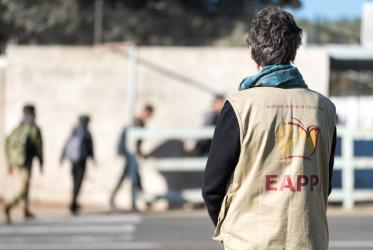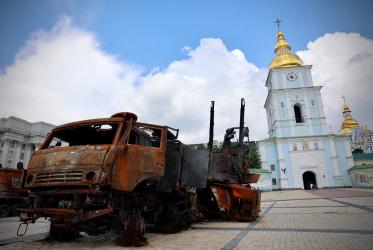Christians need a “spirituality of resistance” to face oppression, violence and experiences of defeat, the general secretary of the World Council of Churches (WCC), the Rev. Dr Olav Fykse Tveit, said in an address at Germany’s biggest Protestant gathering.
“We are all aware that the world and the church, action and spirituality, service to the world and faith belong together,” Tveit said on 6 June at the German Protestant Kirchentag, a church convention that has brought almost 100,000 people to the city of Stuttgart.
Spirituality, Tveit said, “includes prayer, meditation and contemplation, not as ends in themselves, but to deepen the readiness to engage in symbolic action and to develop a common witness in the world”.
Such spirituality is part of the “pilgrimage of justice and peace” launched after the WCC 10th Assembly in 2013 in Busan, Republic of Korea, Tveit said in his address at a podium on “Spirituality in the Context of Violence and Peace”.
The pilgrimage aims to encourage Christians and all people of good will to work together on important issues of justice and peace, in a world of conflict, injustice and pain.
In his address, Tveit praised the insights of the German Lutheran theologian Dietrich Bonhoeffer, executed 70 years ago by the Nazis because of his resistance to Adolf Hitler, whose vision of spirituality was that of a “committed fellowship in Christ”.
He also referred to the Indian ecumenist and WCC leader M. M. Thomas, who inspired the vision of the “spirituality of resistance and combat” within the ecumenical movement. This vision implied engaging in resistance to everything that threatens and destroys life. “Thus the spirituality of resistance is in reality a creative spirituality of justice and peace,” Tveit said.
In 2015, the issue of climate justice is the main focus for the pilgrimage in advance of the United Nations climate conference in December in Paris.
The UN secretary-general, Ban Ki-moon, had told religious leaders that the faith and the ethical convictions of the religions are needed to make the movement for climate justice so strong that politics will have to follow. Ban, said Tveit, “knows just how little progress there actually is in the negotiations for the climate conference”.
In 2016, the pilgrimage should focus on the Middle East, Tveit continued. “The spirituality of peace and justice pushes us to engage in nothing more and nothing less than a just peace between Israel and Palestine.”
He gave his support to the South African Nobel Peace laureate Desmond Tutu for an “open letter to the Kirchentag” in which Tutu called for an end to the occupation of Palestine.
“From our love for the people in Israel and Palestine, we cannot simply accept the current situation as the outcome of the conflict,” Tveit said. “New settlements and the building of the Wall create new facts on the ground that only deepen the conflict and increase injustice.”
Instead of building walls, the WCC general secretary said, “we need to create alternative spaces for encounter and reconciliation, in which peace and justice can grow and flourish.
“Wherever life is threatened, we need to find paths towards each other and spaces to encounter each other that point to the promise of God’s justice and peace. This is how we find the power to engage in resistance against injustice and violence and to overcome enmity and everything that divides.”
Read the speech by the WCC general secretary Rev. Dr Olav Fykse Tveit
Thousands gather in Stuttgart for Germany’s festival of faith and action (WCC press release of 4 June 2015)
Humanity needs to tend the garden of creation, says WCC leader (WCC press release of 5 June 2015)










